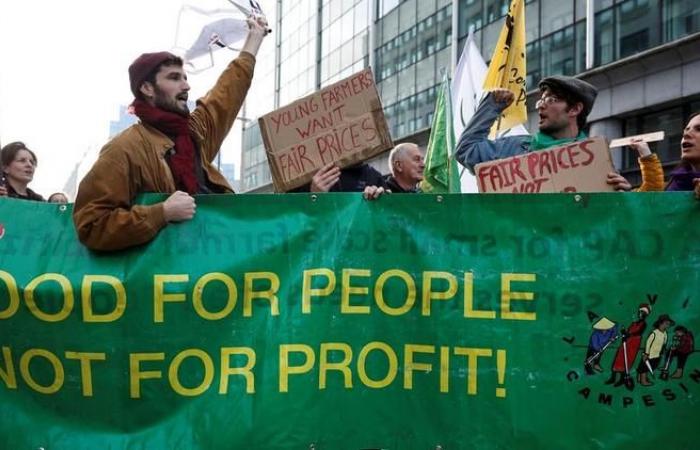The G20 summit is due to open this Monday in Brazil, culminating in the potential signing of the free trade treaty between the European Union and Mercosur. A treaty rejected by French farmers who denounce “unfair competition” and non-compliance with “European standards”.
Better known by its acronym Mercosur (abbreviation of the Spanish “Mercado Común del Sur”), the Southern Common Market is a major economic and political alliance founded in 1991 by the Treaty of Asunción, which brings together several South American countries. South. Argentina, Brazil, Paraguay and Uruguay are permanent members, while other countries were later associated, such as Bolivia, Chile, Colombia, Ecuador, Guyana, Peru and Suriname. In 2006, Venezuela became a permanent member before being suspended in December 2017 for “non-compliance with the charter of its common market.”
The initial objective of this free trade zone is the economic development of its member countries, in particular through the free movement of goods, people, and capital between countries, as well as the elimination of customs duties. Trade is also favored by the establishment of an external tariff and a common commercial policy vis-à-vis third States or alliances of States.
Mercosur is the third largest economic bloc in the world in terms of trade volume, preceded by CUSMA (agreement between the United States, Canada and Mexico) and the European Union. The alliance brings together more than 82% of South America's total GDP. Brazil represents 55% of the region's GDP. It represents a cumulative market of more than 295 million people and a combined gross domestic product (GDP) exceeding $2.7 trillion. But the impact of Mercosur goes beyond its borders, notably with trade agreements, including historic negotiations with the European Union.
The result of nearly twenty years of negotiation, the EU-Mercosur agreement is one of the most important trade agreements in the world, with nearly 780 million people affected and trade volumes of between 40 and 45 billion euros of imports and exports. The negotiations – started in 2000 – culminated politically in 2019 with the signing of a memorandum of understanding. But opposition from several countries, including France, blocked its final adoption, defended on the other hand by Germany. Certain terms of the agreement are particularly strongly rejected by French farmers.
Concretely, the agreement provides for the complete or partial elimination, depending on the products, of customs duties between EU and Mercosur member countries, particularly on industrial (vehicles, medicines, etc.) and agricultural issues. Main point of tension: the food question. The agreement plans to establish quotas below which South American products would not be taxed: 180,000 tonnes per year for sugar, 100,000 tonnes for poultry and 99,000 tonnes for beef. The full list also includes pork (25,000 tonnes per year) and rice (60,000 tonnes per year).
In exchange, taxes imposed on European products by Mercosur would be removed on many products: wine, chocolate, biscuits, soft drinks and even spirits. Dairy products as well as cheeses produced within the EU would be affected by “large quotas” without taxes.
“Unfair competition”
Large farmers' unions denounce “unfair competition” from large South American farms. As early as 2018, the former president of the FNSEA – the main farmers' union – Christiane Lambert, was concerned about the proposed EU-Mercosur agreement. “30,000 farms are in danger and four sectors are affected: ethanol, sugar, the beef sector and poultry,” she explained at the time.
Farmers are also demanding that imported products be subject to the same standards as French products. At the end of 2023, the French inter-professional associations for sugar, poultry, cereals and meat regretted the absence of “mirror clauses” on “environmental and health production standards”. The latter therefore fear that the European market will be flooded with products that do not meet European standards, such as GMO corn or “chicken doped with antibiotics”.
France resists, the EU seems determined
On Wednesday November 13, Michel Barnier spoke after a meeting with the President of the European Commission, Ursula von der Leyen. “I told the president that, under current conditions, this agreement is not acceptable to France and it will not be,” he told journalists.
Denouncing “the disastrous impact that this agreement would have on entire sectors, particularly agriculture and livestock farming”, the Prime Minister added: “We are in solidarity with the agricultural world on this issue which worries a lot, rightly so. title. I recommend that we do not ignore the position of a country like France.”
However, the European Union seems determined to sign this agreement by the end of the year, despite opposition from Paris. To hope to block the decision, France must bring together a blocking minority, made up of at least four states, within the Council which brings together the members of the EU.


Austria and Poland have regularly expressed their opposition but this remains insufficient. However, Michel Barnier assured this Wednesday that French fears are present “in many European countries”. “You will see it in the times to come,” said the Prime Minister.








